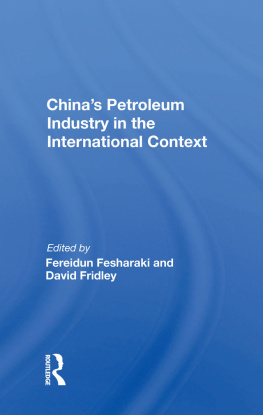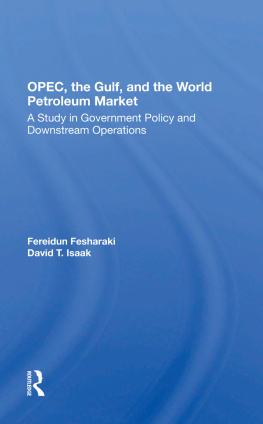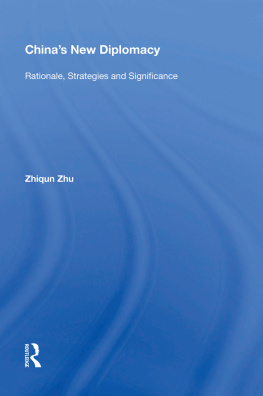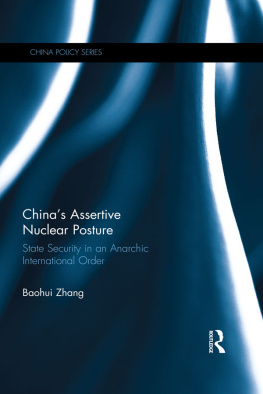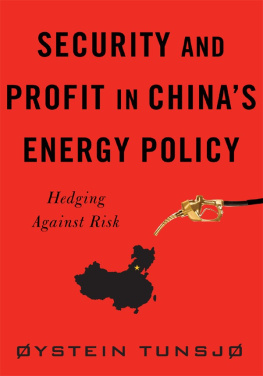China's Petroleum Industry in the International Context
About the Book and Editors
In recent years, China has emerged as the world's sixth largest oil producer and as Asia's largest oil exporter. As a result, attention has become increasingly focused on the prospects for the rapidly growing petroleum industry. Although much of this attention has been directed toward foreign involvement in the development of offshore resources, the most dramatic changes have been taking place onshore in the newly revitalized petroleum extraction and refining industries. This book takes a new look at China's position in both the Asian-Pacific and international oil markets, defines the recent structural changes in these markets, and examines the impact of the Chinese industry on trade, pricing, and the regional refining industry. China's current energy policy is briefly discussed. A comprehensive examination of both the petroleum and the refining industries, including an analysis of China's options for deriving the more valuable fuels from their heavy domestic oil, follows. Contributors to this book have first-hand knowledge of international, regional, and Chinese industries and markets and are thus able to provide an expert overview of this important topic.
Fereidun Fesharaki is a research associate and leader of the Energy Program of the Resource Systems Institute and coordinator of the Institute's OPEC Downstream Project and the Asian Energy Security Project, East-West Center. David Fridley is a research fellow and supervisor of the China Energy Study in the Resource Systems Institute, East-West Center.
Published in Cooperation with the East-West Center Resource Systems Institute Honolulu, Hawaii
China's Petroleum Industry in the International Context
edited by Fereidun Fesharaki and David Fridley
First published 1986 by Westview Press, Inc.
Published 2018 by Routledge
52 Vanderbilt Avenue, New York, NY 10017
2 Park Square, Milton Park, Abingdon, Oxon OX14 4RN
Routledge is an imprint of the Taylor & Francis Group, an informa business
Copyright 1986 by the East-West Center
All rights reserved. No part of this book may be reprinted or reproduced or utilised in any form or by any electronic, mechanical, or other means, now known or hereafter invented, including photocopying and recording, or in any information storage or retrieval system, without permission in writing from the publishers.
Notice:
Product or corporate names may be trademarks or registered trademarks, and are used only for identification and explanation without intent to infringe.
Library of Congress Catalog Card Number: 86-50695
ISBN 13: 978-0-367-02045-3 (hbk)
Contents
by Seiji Naya
by Victor Hao Li
Todd M. Johnson
Robert Hill
David V. Hudson, Jr.
John B. O'Brien
Fereidun Fesharaki, David T. Isaak, and David Fridley
Bai Yiyan
Kim Woodard
Zhang Haoruo
C. N. Cabrera and J. T. Lapinoja
The China Energy Study is a major activity of the Asian Energy Security Project within the Energy Program of the Resource Systems Institute (RSI) at the East-West Center. The China Energy Study organized the China Energy Workshop held in April 1985, the proceedings of which are contained in this volume.
The China Energy Study is funded largely by a grant from the U.S. Department of Energy (DOE). Two groups within the DOE, the Office of Policy Analysis and the Office of International Affairs, are joint sponsors of the study. Additional funding is provided by the East-West Center.
The Asian Energy Security Project and its sister project, the OPEC Downstream Project, are headed by Dr. Fereidun Fesharaki, East-West Center Research Associate and RSI Energy Program Leader. Under Dr. Fesharaki's direction these projects examine the downstream aspect of the petroleum industry (refining, petrochemicals, transportation, marketing, and pricing) as well as natural gas trade and consumption. While the research projects have a global context, the Asia-Pacific region is the focus of study. Currently, the projects monitor closely downstream developments throughout the region; however, projects have been undertaken on specific countries, including China, Korea, Singapore, and Japan. By 1987, it is anticipated that all of the countries in the region will be studied in detail. The projects rely on engineering and economic models as well as on extensive data bases compiled by the project staff of 15 persons from different disciplines.
The current research work on China is based on a Memorandum of Agreement signed with Sinopec in July 1985. The agreement involves cooperative research and work on various aspects of the Chinese refining industry, including software transfer and project evaluation. The OPEC Downstream Project has developed a powerful linear programming package, MATGEN, which is useful in national, regional, or local energy planning as well as in individual refinery optimization work. The China Energy Study will work jointly with Sinopec in adapting MATGEN to suit China's particular needs. Cooperative work in project evaluation will also take place, concentrating on analyzing the optimum technology for upgrading China's heavy crude into light products such as gasoline and diesel fuel. Each case involves exchange visits by engineers, economists, and refinery experts, and the joint work will result in a greater understanding of China's refining industry and its place in the regional and world context.
Although isolated for many years, China's refining industry has rapidly emerged as a strong, energetic, and ambitious actor in the world petroleum scene. As a result, any analysis of the petroleum industry and trade in the Asia-Pacific region should take into account the impact of this important industrial giant.
Seiji Naya
Director
Resource Systems Institute
East-West Center
China's self-sufficiency in energy insulated it to a great extent from the energy pricing upheavals of the 1970s. Further, since China has continued to obtain more than 70% of its total commercial energy from coal, the tenfold increase in the global price of oil affected China much less than it did the industrial nations of the West and the oil-importing countries of the Third World.
The rapid increase in China's trade with the rest of the world that has taken place during the first half of the 1980s links China's economy more closely to that of other countries. This trend is likely to be accelerated in the petroleum sector as China's production as well as consumption of oil increases. The petroleum industry is truly a global industry, with major changes in one part of the world having significant effects on other parts. This is true not only of the oil producing sector, but also of oil refining and product distributionthe so-called downstream operations. Major changes have been taking place during the last few years in the production and supply patterns of various oil products, and these have been the focus of the OPEC Downstream Project and the Asian Energy Security Project of the East-West Center's Resource Systems Institute (RSI).
The proceedings presented here are based on a workshop held at the East-West Center (EWC) sponsored jointly by RSI and the U.S. Department of Energy, and with the participation of Sinopec. The workshop provided the opportunity to plan a cooperative study focusing on approaches toward optimizing the output of refined products from oil.


